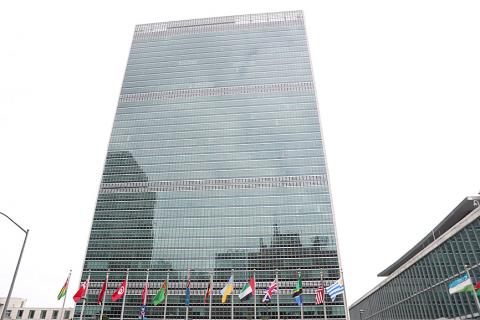Reporters Without Borders (RSF) yesterday called for Taiwanese reporters to be allowed to cover UN events, including the annual World Health Assembly (WHA).
“In recent years, the UN has been under pressure from China to turn down requests for press accreditation from Taiwanese nationals and media on the pretext that Taiwan and its passport are not recognized,” RSF said in a news release.
Taiwanese journalists were denied accreditation to cover the International Civil Aviation Organizati’s (ICAO) 2016 assembly and also to cover the WHA in 2017 and last year, it said.

Photo: Reuters
“The current ban contradicts the fundamental right to free information stated in Article 19 of the Universal Declaration of Human Rights,” the statement quoted RSF secretary-general Christophe Deloire as saying.
“Accrediting bona fide journalists and media is not a political move and should not depend on their nationality or the geographical origin of the outlet they represent,” he said.
Like other journalists and media around the globe, Taiwanese reporters are entitled to cover UN events, even if the UN sees Taiwan as part of China, it said.
The group listed a series of upcoming UN events that it said Taiwanese media should be granted access to, including the 72nd WHA from May 20 to May 28 in Geneva, Switzerland; the 74th annual General Assembly from Sept. 17 to Sept. 30 in New York City; and the 40th ICAO Assembly from Sept. 24 to Oct. 4 in Montreal, Canada.
Taiwan was ranked 42nd out of 180 in the RSF’s 2018 World Press Freedom Index, the highest in Asia.
China was ranked 176th in the index, with more than 65 journalists and citizen journalists imprisoned in the country.

Seventy percent of middle and elementary schools now conduct English classes entirely in English, the Ministry of Education said, as it encourages schools nationwide to adopt this practice Minister of Education (MOE) Cheng Ying-yao (鄭英耀) is scheduled to present a report on the government’s bilingual education policy to the Legislative Yuan’s Education and Culture Committee today. The report would outline strategies aimed at expanding access to education, reducing regional disparities and improving talent cultivation. Implementation of bilingual education policies has varied across local governments, occasionally drawing public criticism. For example, some schools have required teachers of non-English subjects to pass English proficiency

‘FORM OF PROTEST’: The German Institute Taipei said it was ‘shocked’ to see Nazi symbolism used in connection with political aims as it condemned the incident Sung Chien-liang (宋建樑), who led efforts to recall Democratic Progressive Party (DPP) Legislator Lee Kun-cheng (李坤城), was released on bail of NT$80,000 yesterday amid an outcry over a Nazi armband he wore to questioning the night before. Sung arrived at the New Taipei City District Prosecutors’ Office for questioning in a recall petition forgery case on Tuesday night wearing a red armband bearing a swastika, carrying a copy of Adolf Hitler’s Mein Kampf and giving a Nazi salute. Sung left the building at 1:15am without the armband and apparently covering the book with a coat. This is a serious international scandal and Chinese

TRADE: The premier pledged safeguards on ‘Made in Taiwan’ labeling, anti-dumping measures and stricter export controls to strengthen its position in trade talks Products labeled “made in Taiwan” must be genuinely made in Taiwan, Premier Cho Jung-tai (卓榮泰) said yesterday, vowing to enforce strict safeguards against “origin laundering” and initiate anti-dumping investigations to prevent China dumping its products in Taiwan. Cho made the remarks in a discussion session with representatives from industries in Kaohsiung. In response to the US government’s recent announcement of “reciprocal” tariffs on its trading partners, President William Lai (賴清德) and Cho last week began a series of consultations with industry leaders nationwide to gather feedback and address concerns. Taiwanese and US officials held a videoconference on Friday evening to discuss the

PERSONAL DATA: The implicated KMT members allegedly compiled their petitions by copying names from party lists without the consent of the people concerned Judicial authorities searched six locations yesterday and questioned six people, including one elderly Chinese Nationalist Party (KMT) member and five KMT Youth League associates, about alleged signature forgery and fraud relating to their recall efforts against two Democratic Progressive Party (DPP) legislators. After launching a probe into alleged signature forgery and related fraud in the KMT’s recall effort, prosecutors received a number of complaints, including about one petition that had 1,748 signatures of voters whose family members said they had already passed away, and also voters who said they did not approve the use of their name, Taipei Deputy Chief Prosecutor